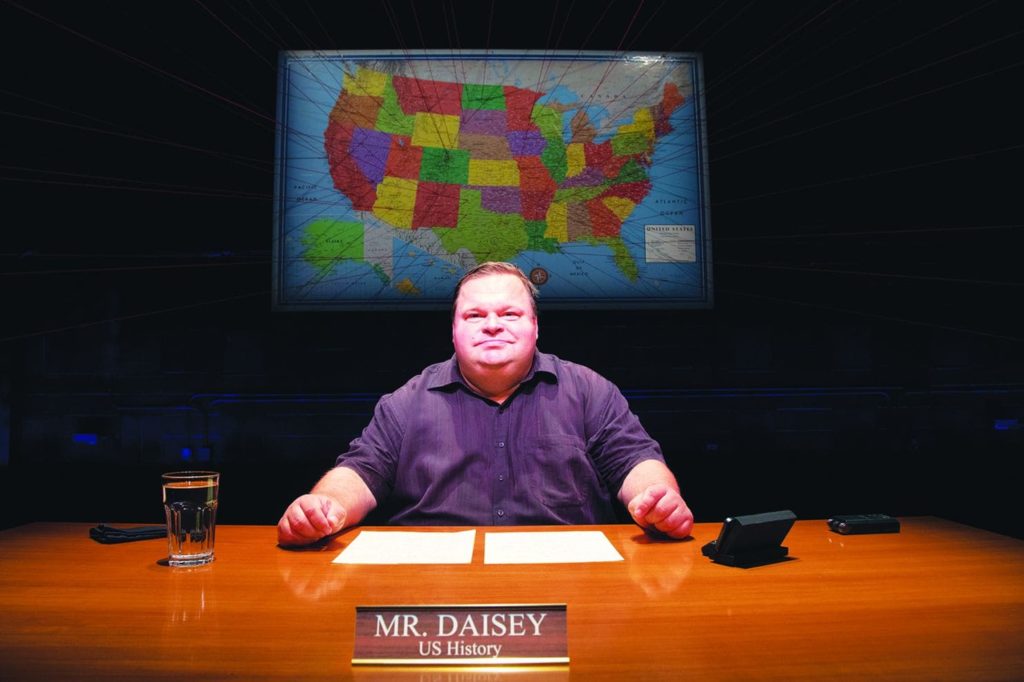Capital Fringe Is in Full Swing
By • July 11, 2019 0 789

It’s, they, them, the theatricals of the groundlings, the far-out masters of theater from here there and everywhere, but especially out there (and often way out there).
The Capital Fringe Festival is back, with its 15th anniversary edition of new plays, shows, productions, uncategorizables, a smorgasbord of all things in life that can be turned into theater, without limitations.
Running through July 28, it brings with it a history of fringe festivals everywhere, which is in part its pitch-a-tent anywhere attitude, but also its sneak progress into the heart of a place, an audience and a community.
So it’s no surprise that this year’s festival, which has been camped at various times and in various places in the District of Columbia over the years — from regular theaters to the open air, dance halls and schools and the occasional bar, outdoors and indoors — should, this time around, be vectored and centered in the booming Southwest Waterfront area. The venues include portions of pioneering Arena Stage as well as a number of churches — Saint Augustine’s Episcopal, Riverside Baptist, Westminster Church, Saint Matthew’s Lutheran and Christ United Methodist — all within walking distance of one other.
It makes for a different sort of theatergoing experience, where you’re never far away from food, drink and dramatic and spiritual sustenance.
It also appears to have gotten bigger in volume, if you go by the numbers provided. This year’s count is as follows: 89 productions, some 500 performances, 13 stages at 8 venues.
The performance range is considerable too, comprising straight, serious, dramatic and comedic shows. Forty-three percent of the productions are drama, 33 percent are solo performances, 40 percent are comedy, eight percent are dance and nine percent are considered to be musical.
From its beginning elsewhere and here, Capital Fringe has always been a home for the outrageous, the strangely gifted, the topical, the irreverent, the quite disrespectful, the outer limits (including science fiction), the alt — neither or necessarily right or left, but just plain alternative — rippling with the voices of those not often heard, out of the shadows and into the limelight of the stage, wherever it may be.
But it’s been our experience that festival productions seem also rooted in the ancient and classic traditions, with riffs and themes and theories and alternative or contemporary embraces and rides with the Shakespearean, the Greeks, even the Victorians.
Those themes are repeated in this festival, which also fairly sings with ideas about what it’s like to be a young, old, female, male, transgender, serious or silly human being today in a world that we made ourselves, in our dreams and schemes and in our ballot box.
The list of productions is pretty long and often dizzying to navigate, what with the wacky, intriguing titles, both of performances and presenting companies. But the Fringe Curated Series, plays specifically presented and curated by the festival, give a hint.
Among them is a superstar individualist commentator on our times, a full-out ambitious monologist by the name of Mike Daisey, who has been a frequent flyer and visitor in Washington, especially at Woolly Mammoth Theatre Company, as well as two new plays and a commissioned new play.
That’s a pretty rangy trio, especially with the presence of Daisey and his “A People’s History,” a one-man take which includes, as it always does with Daisy, some very personal touches and insights.
What we get with “A People’s History” is 18 (yes, count ‘em) different monologues (some already performed by the time of reading this), 30 hours’ worth of takes and thoughts on two very different kinds of history. There’s the history and history books that we and Daisy in the past all learned from, and were to some degree formed by, the old and standard U.S. textbooks; and then there’s liberal historian Howard Zinn’s very different take on American history, “A People’s History of the United States,” written a number of years ago to considerable acclaim and even more considerable controversy.
This being a Daisey monologue, mixed in with Zinn, the effort will also be achieved with some acclaim and perhaps even more controversy.
Certainly, if we’re to judge by Daisey’s track record and our experience of conversations and interviews with him (he’s an engaging and challenging and intriguing guy to talk with), his monologues seem to be an across-the-bow answer to the president’s triumphalist and militaristic view of America, as given in his speech on the Fourth of July.
Also on tap as part of the Fringe Curated Series are three plays of varied themes and styles, beginning with the rooted-in-the-Bard “Shakespeare’s Worst” by Mike Riess and Nick Newlin, a play about what happens when a community theater group tries to put on “Two Gentlemen of Verona,” which prominently features a character which is a dog. Why? Because, as we all know, Queen Elizabeth I loved dogs.
Then there’s “She Sings Light” by Claudia Rosales Waters, in which a post-apocalyptic world rebuilds itself with light, poetry and music.
Then there’s “Hatpin Panic,” a specially commissioned new play by Iris Dauterman on the theme of how turn-of-last-century women defended themselves with a common female tool, and what that might mean to modern issues and times.
As for the rest, they are too numerous to describe, too everywhere and too much, although we’re interested in Scena’s new production “Amelia,” about Amelia Earhart; “Thanksgiving at Macbeth’s,” “Hexagon 219 W Pluribus Screw ‘Em,” “The Little Senator That Could,” “Soul Redeemer,” “We’re All Going to F—— Die,” “American Diet,” “Kafka’s Metamorphosis: The Musical” and “Inferno The Musical,” as well as two plays based on works by horror writer H.P. Lovecraft.
Fringe on!

